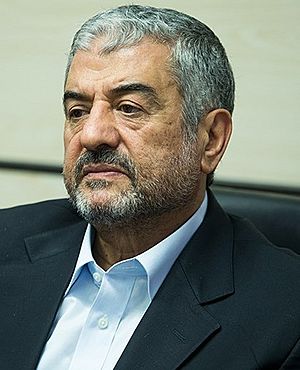Mohammad Ali Jafari facts for kids
Quick facts for kids
Sardar
Mohammad Ali Jafari
|
|
|---|---|

Jafari in 2019
|
|
| Nickname(s) | Aziz Jafari Ali Jafari |
| Born | 1 September 1957 Yazd, Imperial State of Iran |
| Allegiance | Iran |
| Service/ |
Islamic Revolutionary Guard Corps |
| Years of service | 1981–2019 |
| Rank | Major general |
| Commands held | Ground Forces |
| Battles/wars |
|
| Awards | |
Major General Mohammad Ali Jafari (Persian: محمدعلی جعفری, born 1 September 1957), also known as Aziz Jafari and Ali Jafari, is a retired Iranian military officer. He was the commander-in-chief of the Iranian Revolutionary Guard Corps (IRGC) from 2007 to 2019. He was chosen for this important role by Supreme Leader Ali Khamenei on 1 September 2007. He took over from Major General Yahya Rahim Safavi.
Jafari was known as a skilled planner and organizer in military matters. He was also seen as a "technical" military leader.
Contents
Biography
Early Life and Education
Mohammad Ali Jafari was born in Yazd, Iran. He completed his early schooling there. In 1977, he started studying civil (construction) technology at Tehran University. While he was a student, he took part in protests against the government at that time. He was arrested and sent to jail for his involvement.
Military Career and Education
When the Iran–Iraq War began, Jafari joined the Basij paramilitary force. In 1981, he became part of the Revolutionary Guards. He quickly rose through the ranks. In the early 1980s, he commanded battlefields in the south and west of the country. He also helped in the operation of Susangerd. He served as commander of the Ashura Battalion and other military bases.
After the war ended, Jafari went back to university. He finished his degree in civil (construction) technology in 1992. From 1992 to 1993, he taught at the War University of the Revolutionary Guards. He was later put in charge of a special research center. This center focused on creating new defense strategies for Iran. Jafari developed many of his ideas about unconventional or asymmetric warfare at this center.
Before becoming the leader of the Guards, he was also the commander of Thar-Allah Headquarters in Tehran.
Asymmetrical Warfare Strategies
Jafari's work on asymmetrical warfare strategies involved using Iran's landscape for defense. This approach uses lessons learned from the Iran–Iraq War. He explained in 2007 that if an "enemy" had more soldiers or better technology, the IRGC would use asymmetrical tactics. These tactics are like those used by Hezbollah in their 2006 conflict with Israel in Lebanon. He said Iran's strategy would also consider the strengths and weaknesses of other forces in the region.
Public Role and Views
Public Behavior Campaigns
Mohammad Ali Jafari has spoken about public behavior rules. In March 2024, he suggested increasing efforts to encourage certain public conduct in Tehran. He emphasized working with city officials to expand these activities.
Media and Information
Jafari oversaw the IRGC Intelligence Organization. This organization was involved in managing how information was shared with the public. This included actions related to journalists and online users.
Sanctions
International Measures
On 29 September 2010, the United States placed sanctions on Mohammad Ali Jafari. These sanctions were due to accusations of human rights abuses in 2009.
In 2011, the European Union and the United Kingdom also put sanctions on Jafari. These were for providing support in suppressing protests in Syria. Sanctions are like rules put in place by other countries. They aim to limit certain actions or individuals.
See also
 In Spanish: Mohammad Ali Jafari para niños
In Spanish: Mohammad Ali Jafari para niños
- List of Iranian two-star generals since 1979
- Bahman Reyhani
 | Calvin Brent |
 | Walter T. Bailey |
 | Martha Cassell Thompson |
 | Alberta Jeannette Cassell |

